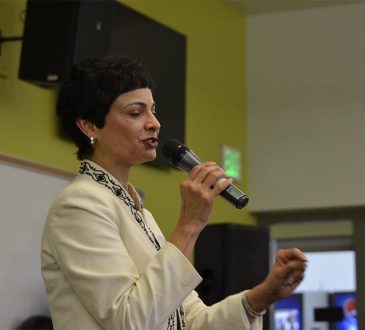Leading as Allies in Times of Xenophobia

Amidst uncertainty, it is more important now than ever for executive leadership to adapt leading change approaches to include a foundation of allyship.
Social stigmatization and discrimination elevate during times of fear and anxiety creating challenges for leaders in workspaces. Amid the coronavirus outbreak, Asian and Asian-American communities are particularly feeling the greatest impact. Discrimination has increased sharply leading to the FBI warning of a surge in hate crimes and to the CDC releasing a statement in efforts to stop the spread of misinformation. When we lack accurate information, we are more susceptible to stereotyping and discrimination.
Even when data-driven information is accessible, when under stress, our brains struggle with the decision-making process. For example, research suggests that as stress increases, we use decision making strategies that are less effective than strategies we may previously have been trained to use. What does this mean? Well, even when we have gained knowledge and skill sets, our stressed brains will find a way to make shortcuts. For the brain, these shortcuts, better known as biases, often fuel our fears and anxiety about particular groups of people (xenophobia).
Not only does growing racism and xenophobia pose serious mental health risks for impacted individuals and communities, including our coworkers, these negative biases can lead to team conflict and drive people to avoid interactions to prevent further discrimination. While we can’t exactly stop the brain’s tendency to use bias in times of stress, exceptional leaders have a unique opportunity to reinforce a culture of allyship and continue to build resilient teams.
Here are 4 steps leaders can take right away to reduce bias and practice allyship:
Build Awareness Through Education
Misinformation leads our brains to rely on biases, becoming a significant source of inducing fear rather than creating awareness and empathy.
- Have company-wide communications be the sources of truth. Be explicit that the company’s approach will be to follow CDC safety guidelines, including outlining the CDC’s stance on misinformation and discrimination. Provide updates weekly on a predictable cadence or even daily (even if the update is simply “no changes”). As leaders, we don’t always know the answers but we can still create certainty in communication.This may look like daily email updates using a structure outlining What We Know, What We Don’t Know, and What We Will Know, or moving monthly all-hands meetings to weekly all-hands. Be sure to include What We Know about people, including those of Asian descent, following CDC guidance.
Pro-tip: Diversify communication channels. Although it may be tempting to solely rely on emails, repetitive messaging in different channels will increase information retention. This can include channels like Slack, all-hands meetings, video town halls with the CEO, and daily standups.
Create Space for Conversation and Action
Many employees are scared to address how bias impacts them, or are unsure how to bring up their concerns in the workplace. Exceptional change leaders create space for conversation about the impact on work (particularly productivity and engagement) and impact on coworkers and communities.
- Invite dialogue in team meetings and all-hands. Ask open questions to start the conversation (with a focus on curiosity vs. criticality). These questions can include: What’s preventing you from being present today? What forms of prejudice are you seeing? What are ways we can be allies? What are we missing in terms of being allies?”
Pro-tip: Have employees submit questions ahead of time and the CEO (or someone from the executive team) follow up at a weekly AMA (Ask Me Anything) session. - Lean on managers. Encourage managers to communicate expectations of workplace behavior, including how to give timely feedback when they hear a comment or see an action that is perceived to be biased or discriminatory. If managers are unsure of how to deliver difficult feedback well, here is a 5-minute video of LifeLabs Co-CEO LeeAnn Renninger sharing an effective, actionable framework.
- Leverage 1-1s. Encourage managers to learn more about how their teams are navigating information by asking questions like, “Who do you go to when you need support or have questions? How clear do you feel about where to go for information or questions?”
Pro-Tip: Asking more emotion-based questions in one-on-one meetings will also create space for conversation related to how bias may be impacting individuals or to bring about concerns. Questions include, “How have you been feeling? How can I support you?”
Identify As an Ally and Be a Role Model
In times of crisis, we look to leaders to role model how we should think, feel, and act. Thus, the call to action is to model the behavior we want to see through our body language, words, and actions. If we want our teams to unite in shared identity and practice allyship, great leaders find ways to demonstrate this, including:
- Level up the shared identity language in company-wide communications.
Example: We are all in this together. - Link to language in the company mission or values.
Example: Now is the time to live our value of ‘always be learning’.
Let’s take the time to educate ourselves on the experience of xenophobia during this time. - Create or continue shared celebration and learning rituals.
Example: Because of everyone’s continued hard work, we are seeing many customers expressing gratitude for our partnership through trying times. Great work, everyone! - Create ‘solidarity moments’.
Example: Invite everyone to wear company swag at the next all-hands meeting.
Commit to an Ongoing Process
We know that teams have a head start on resiliency when they have created and reinforced a culture of inclusion. Commit to allyship as an ongoing process by:
- Offering private employee resource groups. Create opportunities for impacted individuals to be able to speak with one another (and offer company resources like spaces and times to meet, a Slack channel, and/or an offer of executive sponsorship).
- Providing skills training. Create a learning experience that is interactive and provides practical, actionable steps that people can use to overcome bias and practice allyship.
Right now is a unique opportunity for leaders to demonstrate tangible outcomes of allyship. Encourage the entire executive team to hold one another accountable to these initiatives. Building resilience and investing in unifying teams will drive a culture of inclusion and overall commitment to the organization.
Written by Dr. Vaneeta Sandhu. Have you read?
Antigua and Barbuda Citizenship by Investment Program (CIP), St. Lucia CIP: Saint Lucia Citizenship By Investment Program, Vanuatu CIP: Vanuatu Citizenship By Investment Program, Montenegro Citizenship By Investment Program (CIP)
Add CEOWORLD magazine to your Google News feed.
Follow CEOWORLD magazine headlines on: Google News, LinkedIn, Twitter, and Facebook.
This report/news/ranking/statistics has been prepared only for general guidance on matters of interest and does not constitute professional advice. You should not act upon the information contained in this publication without obtaining specific professional advice. No representation or warranty (express or implied) is given as to the accuracy or completeness of the information contained in this publication, and, to the extent permitted by law, CEOWORLD magazine does not accept or assume any liability, responsibility or duty of care for any consequences of you or anyone else acting, or refraining to act, in reliance on the information contained in this publication or for any decision based on it.
Copyright 2024 The CEOWORLD magazine. All rights reserved. This material (and any extract from it) must not be copied, redistributed or placed on any website, without CEOWORLD magazine' prior written consent. For media queries, please contact: info@ceoworld.biz
SUBSCRIBE NEWSLETTER








